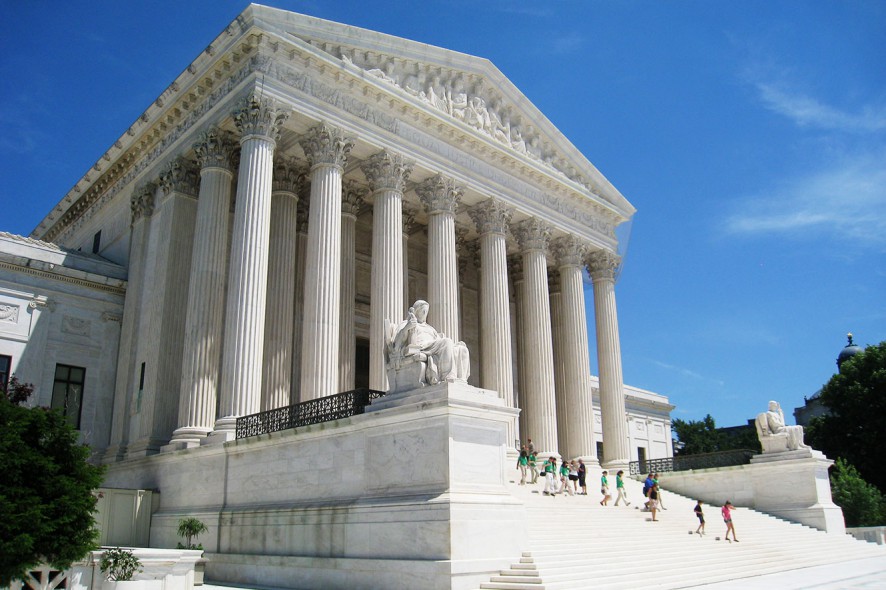Supreme Court of The United States: While deciding the instant issue related to the First Amendment, the SCOTUS Justices had to decide that whether the City of Boston violated the Free Speech Clause in refusing to allow a local organisation fly their “Christian flag”. In an unanimous decision, the Court held that the flag-raising program did not express government speech; therefore, Boston’s refusal to let petitioners fly their flag, violated the Free Speech Clause of the First Amendment, as third- party flag raisings form private speech and not government speech.
Background and Legal Trajectory: There are three flagpoles outside the entrance to Boston City Hall, on City Hall Plaza. The first and the second flag pole carries the American flag and the flag of the Commonwealth of Massachusetts respectively. The third flag pole usually flies Boston’s own flag, but the City had allowed groups to hold ceremonies on the plaza during which participants may hoist a flag of their choosing on the third pole in place of the city’s flag- like other countries’ flags, or flags associated with groups or causes, like the Pride Flag, a banner honoring emergency medical service workers etc.
In 2017, Harold Shurtleff, the director of an organization called Camp Constitution, asked to hold an event on the plaza to celebrate the civic and social contributions of the Christian community. As part of that event, he wished to raise what he described as the “Christian flag”. Concerned that flying a religious flag at City Hall could violate the Establishment Clause and finding no past instance of the city’s having raised such a flag, the Commissioner of Boston’s Property Management Department told Shurtleff that the group could hold an event on the plaza but could not raise their flag during the celebrations.
Shurtleff and Camp Constitution took the legal route claiming that Boston’s refusal to let them raise their flag violated, among the First Amendment’s Free Speech Clause.
The District Court held that flying private groups’ flags from City Hall’s third flagpole amounted to government speech, so Boston could refuse petitioners’ request without running afoul of the First Amendment. The same was affirmed by the First Circuit.
*The First Amendment provides that Congress makes no law respecting an establishment of religion or prohibiting its free exercise. It protects freedom of speech, the press, assembly, and the right to petition the Government for a redressal of grievances[1].
Observations: The Full Bench of the Court comprising of John Roberts, C.J., Stephen Breyer (who delivered the opinion of the Court), Clarence Thomas, Samuel Alito, Elena Kagan, Sonia Sotomayor, Brett Kavanaugh, Neil Gorsuch and Amy Coney Barret, JJ., upon perusing the facts of the case, framed the issue that whether the flags Boston allows others to fly, express government speech, and whether Boston could deny petitioners’ flag-raising request.
Vis-a-vis government speech, the Court noted that The Free Speech Clause does not prevent the government from declining to express a view. The government must be able to decide what to say and what not to say when it states an opinion – “The boundary between government speech and private expression can blur when, as here, the government invites the people to participate in a program. In those situations, the Court conducts a holistic inquiry to determine whether the government intends to speak for itself or, rather, to regulate private expression”.
It was observed that at the time of refusal, Boston had no written policy limiting use of the flagpole based on the content of a flag – “The most salient feature of this case is that Boston neither actively controlled these flag raisings nor shaped the messages the flags sent…But the key issue is whether Boston shaped or controlled the flags’ content and meaning; such evidence would tend to show that Boston intended to convey the flags’ messages as its own”.
Referring to the precedents of Walker v. Texas Division, Sons of Confederate Veterans, Inc., et al., 2015 SCC OnLine US SC 67 , Matal, Interim Director, United States Patent and Trademark Office v. Tam, 2017 SCC OnLine US SC 84 and Pleasant Grove City v. Summum, 2009 SCC OnLine US SC 22; the Justices stated that the city’s practice was to approve flag raisings without exception. Since at the time, Boston had no clear written policies or internal guidance about what flags groups could fly and what those flags would communicate; thus Boston’s control is not comparable to the degree of government involvement like in the selection of park monuments (Summum) or license plate designs (Walker).
Conclusion: With Boston’s lack of meaningful involvement in the selection of flags or the crafting of their messages, the Court went on to classify the third-party flag raisings as private and not government speech
Further noting that Boston denied the petitioner’s request on the sole concern of the religious nature of the flag, the Court held that since the flag-raising program did not express government speech, and Boston’s refusal to let petitioners fly their flag violated the Free Speech Clause of the First Amendment – “When the government does not speak for itself, it may not exclude private speech based on “religious viewpoint”; doing so “constitutes impermissible viewpoint discrimination””.
[Harold Shurtleff v. City of Boston, No. 20–1800, decided on 02-05-2022]
[1] The Constitution, The White House






